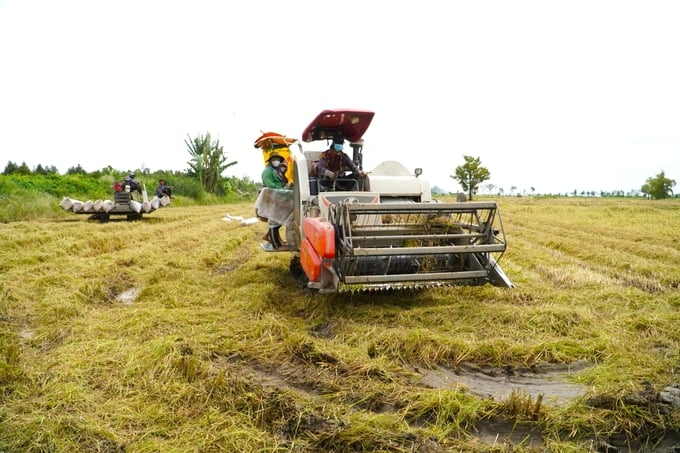December 30, 2025 | 18:53 GMT +7
December 30, 2025 | 18:53 GMT +7
Hotline: 0913.378.918
December 30, 2025 | 18:53 GMT +7
Hotline: 0913.378.918

At the national workshop "Soil and Fertilizer", experts presented the current status of soil fertility and discussed solutions to improve the efficiency of fertilizer use in rice cultivation. Photo: Kim Anh.
In collaboration with the Vietnam Rice Industry Association and Binh Dien Fertilizer Joint Stock Company, the Department of Crop Production (Ministry of Agriculture and Rural Development - MARD) organized the inaugural national conference of 2024 on "Soil and Fertilizers" on October 2. The conference's theme was "Current Fertility Status of Rice Land in the Mekong Delta and Solutions to Improve Fertilizer Efficiency in Rice Cultivation."
The Mekong Delta is responsible for 50% of the total rice output and 90% of the country's rice exports, with over 1.5 million hectares of rice-growing land and more than 3 million hectares of annual cultivated area..
Nevertheless, experts predict that the region will encounter substantial obstacles as a result of an imbalance in soil nutrients. Unbalanced use of inorganic fertilizers, high-intensity cultivation, and improper land exploitation have all had a detrimental impact on the physical, chemical, and biological properties of the soil.

Prof. Dr. Nguyen Bao Ve, Vice Chairman of the Science and Technology Council (Binh Dien Fertilizer Joint Stock Company) assessed that soil fertility in the Mekong Delta has not reached the alarming threshold, but its digestibility is decreasing. Photo: Kim Anh.
Professor Dr. Nguyen Bao Ve, Vice Chairman of the Science and Technology Council at Binh Dien Fertilizer Joint Stock Company, conducted an analysis that revealed that the Smart Rice Cultivation Program employed specialists to collect 76 soil samples from 38 locations throughout the Mekong Delta in order to evaluate soil quality.
The analysis of eight soil fertility indicators in accordance with national standards revealed that the soil's calcium (Ca) and magnesium (Mg) levels are adequate for rice cultivation; however, the Ca/Mg ratio is unbalanced. In particular, the Ca/Mg ratio is less than 1 in coastal regions, 1 to 3 in the delta region, and over 3 in upstream areas. To ensure that the rice plant can absorb nutrients, the standard ratio should be between 3 and 4.
All three regions (coastal, delta, and upstream) are below the detrimental threshold for rice in terms of salinity. Throughout the regions, the acidity (pH) level ranges from 5 to 5.5.
Professor Dr. Nguyen Bao Ve underscored the importance of producers considering the significant impact of pH levels on production. The quality of organic matter has declined, despite the fact that the soil's organic matter content has not decreased. This suggests that rice plants are susceptible to organic toxicity as a result of continuous cultivation.
The carbon (C) and nitrogen (N) ratio in the soil, also known as the C/N ratio, is extremely important because it influences the rate of organic matter decomposition and the development of microorganisms in the soil. The C/N ratio is approximately 7.8 in coastal regions, while it ranges from 13.4 to 14 in the delta and upstream regions. As per regulations, the C/N ratio must be less than 12.
Farmers in coastal regions allow the land to dry out, which enhances soil quality and results in higher profitability compared to other regions, as a result of a dry season without irrigation. Furthermore, the soil in coastal regions is abundant in phosphorus (P) and potassium (K), whereas these levels are only average or deficient in the delta and upstream regions.

Rice production in the Mekong Delta is under pressure from intensive farming, leading to a decline in soil quality. To maintain productivity, farmers are forced to increase the amount of fertilizer in their fields, leading to waste and environmental pollution. Photo: Kim Anh.
Professor Dr. Nguyen Bao Ve determined that the Mekong Delta's soil fertility is not yet at a critical juncture; however, the availability of nutrients is progressively diminishing. Consequently, it is imperative that experts, local authorities, and farmers develop and execute strategies to improve and convert beneficial indicators, particularly at the commencement of the agricultural season.
These solutions involve the utilization of specific cultivation techniques and soil enhancement fertilizers, as well as the avoidance of straw burning in favor of its incorporation into the soil through microbial treatment. In order to create a denser cultivation layer, farmers should plow the soil deeper (10-15 cm), allow it to dry out for approximately three weeks, soak the soil for approximately two weeks, and use fertilizers appropriately.
Translated by Linh Linh

(VAN) Located in three former provinces, Nam Dinh, Thai Binh, and Ninh Binh, and now in two provinces, Ninh Binh and Hung Yen, "Red River Delta" is the name of Vietnam's first interprovincial coastal wetland World Biosphere Reserve.
/2025/12/29/1046-1-210728_624.jpg)
(VAN) In 2025, Viet Nam recorded severe and extreme disasters, breaking multiple historical records and causing heavy losses in lives, property, and infrastructure nationwide.

(VAN) Applied technologies, water-saving irrigation is a strategic solution to promote climate-resilient agriculture and strengthen water security in the uplands.
/2025/12/29/3936-3-163422_251.jpg)
(VAN) Can Gio mangrove forest in particular and the entire Can Gio Mangrove Biosphere Reserve in general hold great potential for carbon credits.

(VAN) Chu Pah Rubber has announced its products that comply with the EU Deforestation Regulation (EUDR), affirming its commitment to sustainable production and product origin transparency.

(VAN) Deputy Director Nguyen Hoai Nam stated that a digital data platform will be developed with agricultural sector databases, utilizing AI to help farmers make informed decisions on 'watering correctly, sufficiently, and efficiently.’
/2025/12/29/4841-2-134224_777.jpg)
(VAN) From only about 10 individuals in 2009, the wild elephant population in Dong Nai has recovered to nearly 30 animals after more than 10 years.